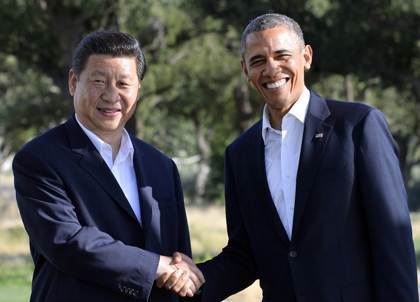Presidents Barack Obama and Xi Jinping opened their crucial first summit Friday, both calling for a new approach to relations between the US superpower and China, the rising giant.
Obama and Xi inaugurated a partnership that will shape the crucial relations between their countries for years to come with handshake in the grounds of the sumptuous Annenberg resort, under a blazing California sun.

Their laid-back summit, stripped of the normal pageantry of Sino-US meet-ups, was called in a bid to forge a personal bond between Xi, who has just assumed full power as Chinese leader, and Obama, who is beginning his second term.
Obama told reporters, before a bilateral meeting to be followed by an intimate private dinner, that he wanted to achieve "a new model of cooperation" with Beijing.
He also wasted no time in hitting a key theme of the visit from the US side -- complaints of an alleged Chinese Internet spying effort targeting American military and commercial secrets and intellectual property.
Obama said both sides should "work together" on issues such as cybersecurity.
Xi, like Obama wearing a dark suit with an open collar and no tie, mirrored his host's theme of a new approach to an increasingly testy relationship, saying he was looking to "shape the future" US-China ties.
Allegations that China has waged a cyber-hacking campaign against the United States are likely to dominate the talks, which will also take up the constant trade niggles that have soured ties between the world's two largest
economies.
But Obama also has a wider purpose -- trying to glean the strategic vision of the man set to guide a fast-growing China through the rest of his own presidency, with major effects on Obama's own foreign policy legacy.
The 59-year-old Xi holds credibility as the son of one of China's founding revolutionaries and speaks in a confident, free-flowing style, a shift from the stilted formality of his predecessor Hu Jintao that frustrated the White House.
The two leaders had not been expected to meet until the G20 summit in Russia in September. But both sides, sensing uncertainty seeping into a complicated and often difficult relationship, saw value in an earlier encounter.
White House spokesman Josh Earnest said that Obama wanted "an informal atmosphere" and hoped "to see if there are broader opportunities for us to expand those issues on which we cooperate."
China has signaled that it believes it too is a victim of cyber espionage.
In troublesome optics for Obama, the summit comes as he faces criticism over revelations that the United States has run a massive Internet and telephone surveillance program for security purposes.
The White House rejected charges that the scandal weakened Obama's hand and instead said that the row showed how the United States holds vibrant discussions on individual rights.
"This is a pretty good illustration of the type of conversation we want to have about respecting civil liberties and protecting the constitutional rights of the people that you govern," Earnest said.
In a bid to ensure cyber security does not overshadow this summit, the two sides have already announced they will hold working group level talks on the issue in July.
North Korea will also come up, with US officials encouraged at signs that China is becoming impatient with Pyongyang's saber-rattling.
On the eve of the summit, North Korea and US-allied South Korea agreed to resume dialogue following months of soaring tensions.
Xi will be interested to hear Obama explain his signature diplomatic priority of ramping up the US presence to Asia -- a so-called "pivot" policy that many Chinese see as a bid to contain Beijing's rise.
Xi has called for a "new type of great power relationship" and -- in a sign that China can also focus on Washington's backyard -- visited Mexico, Costa Rica and Trinidad and Tobago before coming to California.
Several hundred protesters jeered Xi outside of the tightly guarded vacation compound, including members of the banned Falungong spiritual movement and Tibetans who chanted, "China, get out of Tibet!"
(AFP)




![[KH Explains] No more 'Michael' at Kakao Games](http://res.heraldm.com/phpwas/restmb_idxmake.php?idx=644&simg=/content/image/2024/04/28/20240428050183_0.jpg&u=20240428180321)






![[Grace Kao] Hybe vs. Ador: Inspiration, imitation and plagiarism](http://res.heraldm.com/phpwas/restmb_idxmake.php?idx=644&simg=/content/image/2024/04/28/20240428050220_0.jpg&u=)






